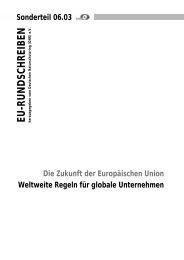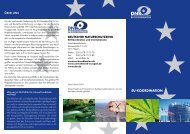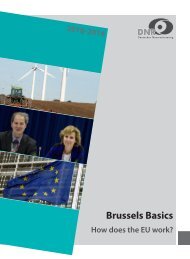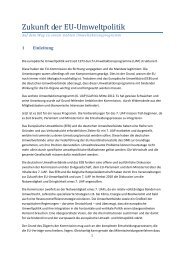Nachhaltiges Europa Abschlusspublikation - Global Marshall Plan
Nachhaltiges Europa Abschlusspublikation - Global Marshall Plan
Nachhaltiges Europa Abschlusspublikation - Global Marshall Plan
Erfolgreiche ePaper selbst erstellen
Machen Sie aus Ihren PDF Publikationen ein blätterbares Flipbook mit unserer einzigartigen Google optimierten e-Paper Software.
• We are developing integrated holistic strategies<br />
for a sustainable use of natural resources and<br />
the prevention and recycling of waste, while our<br />
Integrated Product Policy initiative seeks to reduce<br />
the environmental impacts of products throughout<br />
their lifecycles.<br />
• At a big EU biodiversity conference in Ireland,<br />
organised by the Irish Presidency, we identified<br />
further measures that we need to take to stop<br />
biodiversity loss in the EU, but also globally.<br />
• We will soon publish a Handbook on Green<br />
Public Procurement, which will advise public<br />
authorities at all levels in the Member States how<br />
to purchase sustainable goods and services.<br />
• We are reaching out to citizens by informing<br />
them on environmental matters and encouraging<br />
them to participate in decision-making, by closely<br />
consulting their associations and other stakeholders<br />
when we draw up new policies, and by giving<br />
consumers a choice through eco-labelling.<br />
• Major policy proposals by the European Commission<br />
are now accompanied by impact assessments,<br />
which examine and balance their economic,<br />
social and environmental effects.<br />
Secondly, the EU has taken steps to improve coherence<br />
between its internal policies and their external<br />
effects. The ongoing reforms of the EU's<br />
common agricultural and fisheries policies clearly<br />
represent a move towards greater sustainability.<br />
Thirdly, we are delivering on our international<br />
commitments.<br />
• The EU offered major concessions to inject<br />
new life into the WTO talks under the Doha<br />
Development Agenda.<br />
• Overall, EU Member States are steadily increasing<br />
their levels of official development aid as<br />
agreed at the international Monterrey conference<br />
on financing development two years ago.<br />
• We are spending this aid more effectively<br />
through better co-ordination of development cooperation<br />
policies, the untying of aid, and participation<br />
in the Heavily Indebted Poor Country Initia-<br />
tive.<br />
• Last, but not least, we launched three major<br />
Partnership initiatives in Johannesburg: the EU<br />
Energy Initiative, the Forest Action <strong>Plan</strong> and the<br />
EU Water Initiative. For the Water Initiative, which<br />
seeks to improve access to clean water and sanitation<br />
in the developing world, the EU has recently<br />
made half a billion € available.<br />
SD and economic growth<br />
<strong>Nachhaltiges</strong> <strong>Europa</strong><br />
As you can see, the EU’s record in advancing sustainable<br />
development both in the EU and globally<br />
is impressive. However, we must not fool our-<br />
selves by painting too rosy a picture. We are not<br />
there yet.<br />
We have the tools, we have the knowledge, we<br />
have the commitments. So, what is missing?<br />
I would like to raise this question for discussion<br />
here, but will briefly mention two issues that I<br />
consider important.<br />
One problem I see is that economic growth is still<br />
regarded as the main key to improving human<br />
welfare. And during times of economic downturn,<br />
all the other aspects of sustainable development -<br />
its social, environmental, future-oriented and<br />
intra-generational dimensions - tend to be consid-<br />
ered “unaffordable extras.”<br />
Most of us will probably agree that this is a shortsighted<br />
view. There is no business case for using<br />
chemicals without knowing what they do to us. We<br />
are paying dearly for this mistake, for example by<br />
spending billions of € and US$ on treating and<br />
compensating victims of asbestos and removing it<br />
from our buildings.<br />
There is no business case for standing by and<br />
watching climate change unfold. According to<br />
Swiss Re, one of the world's largest re-insurers,<br />
the economic costs of global warming threaten to<br />
rise to 150 billion dollars a year in 10 years.<br />
And still, opposition to REACH and our climate<br />
change policies is strong. Is it due to the fact that<br />
the critics are not the ones who have to pay for<br />
the damage caused by chemicals and climate<br />
change - that the external costs of certain policies<br />
and practices are not internalised? If political leaders<br />
are willing to change this - how can they do<br />
this without triggering an exodus of businesses?<br />
Secondly, sustainable development will not happen<br />
unless there is real demand for it in society –<br />
and this demand is not there yet. Is it because it is<br />
a somewhat abstract concept that is difficult to<br />
convey in concrete terms? What is needed to convince<br />
the wider public of the value of sustainable<br />
development?<br />
As I said at the beginning, sustainable development<br />
is a vision. It has the potential to become a<br />
guiding principle for future human development<br />
and to help us reach a balance between economic<br />
freedoms, social justice and a healthy planet,<br />
between North and South – planet, people,<br />
prosperity.<br />
11
















